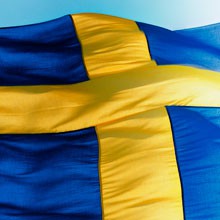Eurovision Song Contest fans have already got used to having songs written and co-written by Swedish songwriters in the contest for some time now. This year marks another record in this sense, as a total 10 of the songs in the final have Swedish involvement. And each and every Swedish penned song also qualified from the semi-finals. These are the songs:
Azerbaijan: Sabina Babayeva – When the music dies (Anders Bagge, Sandra Bjurman, Stefan Örn, Johan Kronlund)
Cyprus: Ivi Adamou – La la love (Alex Papaconstantinou, Björn Djupström, Alexandra Zakka, Viktor Svensson)
Greece: Eleftheria Eleftheriou – Aphrodisiac (Dimitri Stassos, Mikaela Stenström and Dajana Lööf)
Ireland: Jedward – Waterline (Nick Jarl, Sharon Vaughn)
Italy: Nina Zilli – L’amore è femmina (Nina Zilli, Christian Rabb, Kristoffer Sjökvist, Frida Molander , Charlie Mason)
Malta: Kurt Calleja – This is the night (Kurt Calleja, Johan Jämtberg, Michael Gunnerås)
Norway: Tooji – Stay (Tooji, Peter Boström, Figge Boström)
Spain: Pastora Soler – Quédate conmigo (Thomas G:son, Tony Sanchez-Ohlsson, Erik Bernholm)
Sweden: Loreen – Euphoria (Thomas G:son and Peter Boström)
United Kingdom: Engelbert Humperdinck – Love will set your free (Martin Terefe, Sacha Skarbek)
Stuck in the semi-final was also the Finnish entry, sung in Swedish but still fully a Finnish production, as Swedish is also an official language in Finland. A small connection to Sweden connection can be found however, as the songwriter Jonas Karlsson studied sound engineering there.
Obviously there is a very active song writing and music production industry in Sweden, and as there are every year between 3000 and 4000 songs submitted to the Swedish Melodifestivalen, there is obviously a massive surplus of music available for other markets as well. Whereas many of the other countries’ Swedish collaborations are made specially for them and their selected artists, it has become clear in different contexts that many have also been first submitted to Melodifestivalen and rejected.
The Swedish broadcaster SVT has only in recent years changed their rules so, that the Melodifestivalen entries can be co-written by foreigners, but it is very rare that any such work makes the final selection. So the balance of trade is definitely in favour of exports in Sweden. Of course Sweden is one of the biggest music exporters in the world, so maybe this high influence at the Eurovision Song Contest is only natural. And the doors for Swedish music export were of course opened by Abba winning the Eurovision Song Contest in 1974.
[tube]http://www.youtube.com/watch?v=3FsVeMz1F5c&fmt=18[/tube]




